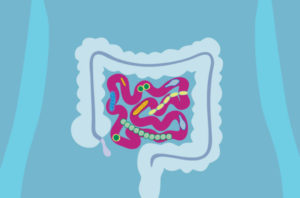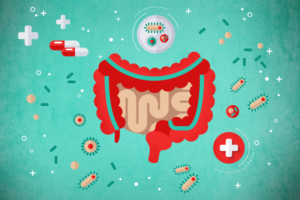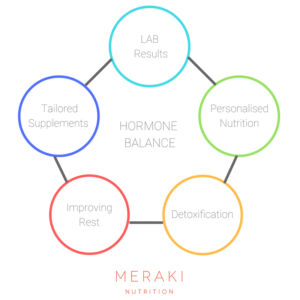What is SIBO? (Small Intestinal Bacterial Overgrowth)
Small Intestine Bacterial Overgrowth is an accumulation of bacteria in the small intestine. It’s an overgrowth of bacteria that normally lives in the gastrointestinal tract but has abnormally overgrown in a location not meant for so many bacteria.
Symptoms of SIBO
- Bloating/abdominal gas
- Flatulence, belching
- Abdominal pain, discomfort or cramps
- Constipation, diarrhea or a mixture of the two
- Heartburn
- Nausea
- Malabsorption of iron, vitamin D, A, E and a B12 deficiency with or without anemia and osteoporosis
- Systemic symptoms such as; headaches, fatigue, joint/muscle pain, and certain dermatology conditions
- Unable to lose weight despite doing all the ‘right things’
Conditions commonly associated with SIBO include:
- IBS
- IBD
- Celiac Disease
- Diabetes
- Fibromyalgia
- Rosacea
- Parkinson’s Disease
- Obesity
Risk factors for development of SIBO include structural/anatomic issues, motility disorders, organ system dysfunction, elderly age and various medications (recurrent antibiotics, PPIs) that alter the gut microflora populations.
The Problem:
The overgrowth of bacteria interferes with our normal digestion and absorption of food and can also cause damage to the lining or membrane of the small intestine – known as ‘leaky gut syndrome’.
- The bacteria consumes some of our food, which over time leads us to become deficient in their favourite nutrients such as iron and B12, which can then cause anemia or chronic low ferritin.
- They consume the foods that are unable to be absorbed due to Small Intestinal lining damage – this continues the overgrowth and creates a vicious cycle.
- After eating our food they produce gas within our Small Intestine. The gas causes abdominal bloating, abdominal pain, constipation, diarrhea or both (the symptoms of IBS). Excess gas can also cause belching and flatulence.
- They decrease proper fat absorption by disrupting bile used for fat digestion. This can lead to deficiencies of vitamins A & D and fatty greasy stools.
- When the lining of the gut is damaged, larger food particles that are not able to be fully digested can enter into the blood stream. The immune system reacts to this causing food allergies/sensitivities and other symptoms such as eczema, and hay-fever.
- Bacteria themselves can also enter the body/bloodstream. The immune system reacts to this bacteria and their cell walls (endotoxins) causing chronic fatigue, body pain and a burden on the liver.
- Finally, the bacteria excretes acids which may, in high amounts lead to neurological and cognitive symptoms such as brain fog, poor memory, lack of concentration and anxiety.
When might SIBO be the cause your IBS symptoms?
- You have had an acute bout of gastroenteritis or food poisoning and never fully recovered
- Your IBS symptoms dramatically improved after taking antibiotics
- Your IBS is worse after probiotic supplements that also contain ‘pre-biotics’ such as FOS or Inulin
- Increasing your fibre intake increases constipation and other IBS symptoms
- When celiac symptoms have no improvement, even when you carefully follow a gluten free diet
- When taking opiates/painkillers result in constipation
- When your Ferritin levels are chronically low with no other apparent cause
What Are The Underlying Causes of SIBO?
Any factors that alter the structure or function of gut tissue will become a risk for SIBO.
For example elevated glucose levels provide the perfect condition for bacteria to feed and grow. A poor immune defense will allow bad bacterias to settle in and get comfy.
Slow digestion, and thickening of the bowel wall (which leads to chronic constipation) means food takes longer than it should to travel through the intestines, providing plenty of nutrients for the bacterias to ‘steal’ leaving you nutrient deficient.
Poor gastric, pancreatic, gall bladder and stomach acid secretions encourage the growth of SIBO because without these gastric juices and enzymes, foods cannot be digested and gut motility is slower.
Trauma and lifestyle factors contribute to risk of SIBO. Heavy alcohol consumption and even over-training are important considerations because of the stress these put on the digestive system. Athletes and runners are all at risk, as are those with brain trauma, head injuries, and Ehlers-Danlos Syndrome (Joint Hypermobility type).
What do we do if we suspect you have SIBO?
It is common to see frequent recurrence in SIBO, therefore it is key that we find the underlying cause. When the underlying cause can be removed or at least controlled, relapsing SIBO can be prevented.
In other cases SIBO maybe a chronic condition that requires management long term. The good news is there are many options for control of SIBO.
- Firstly we would need to test. We need to confirm that you have SIBO, and if it is hydrogen type or methane type
- Next we address your diet and provide you with a ‘SIBO’ eating plan
- Then we work to eradicate SIBO using natural antibiotics (antimicrobials) for 4-6 weeks depending on the levels of the SIBO
- We will work on healing the gut (leaky gut is expected with SIBO) and this can take up to 3 months depending on the severity of the SIBO and what you tell us about your symptoms.
- We re-inoculate the gut with good bacteria using high strength probiotics
- 3 months along, we re-test to assess if the SIBO been removed successfully
What’s involved in the testing for SIBO?
The test is a breath test, that requires you to blow into a bag every 20 minutes for 3 hours. Prior to the test you need to have fasted for 12 hours, and not taken any vitamins or probiotics.
After the first breath sample is taken you drink a solution called ‘Lactulose’. This triggers your gut bacteria to become active, and it is this activity that is measured through the gases the bacterias release.
The test is quite fun to do, not invasive, and the kit is delivered to your home so you get on with bits and pieces in-between collecting samples. Once you have all your breath samples collected, you call the number in the kit and a courier will come and collect it from you.
The turnaround is pretty quick on this test, usually 7-10 days, and the results will be sent to us. We will notify once we have them so we can schedule an appointment to discuss your protocol.
The cost of this test is £150 and we use Genova Diagnostics Labs. You can view a sample report here



